- Opinion
- 21 Nov 23
JFK 60th Anniversary: So, Who Really Shot The President?

That is the question celebrated crime novelist, and author of the acclaimed autobiography Adventures In Wonderland published earlier this year, Paul Charles attempts to answer in a riveting deep dive into one of the 20th century's most shocking and consequential moments politically. In Part 1 of a three-part online special, he reflects on the profound impact JFK's death made on him, and looks at how the murky world of the CIA, the FBI and J. Edgar Hoover could be connected to his death...
JFK was brutally assassinated just three months after my 14th birthday. This was the first bit of international news which had affected me in a powerful way. Why was I so traumatised by the incident? Well, I suppose I came to realise for the first time in my life, evil had the ability and the wherewithal to win over good.
I remember the night of the 22 November 1963 vividly. I was attending a Boys Brigade evening in a school gym in Magherafelt in Northern Ireland. We were busy going about our tasks when I noticed one officer whisper to another and then the second one whispered to a third and so on and on until, eventually, the Captain was in on the fruits of the whispering.
Some fruits leave a bitter taste.
The Captain, Charles H. Rankin, called us altogether and solemnly announced that President Kennedy – the President of the United States of America – had been shot dead in Texas less than an hour earlier!
The incident which was to nearly shake the world off its axis happened at 12.30 p.m. local time in Dallas and 18.30 p.m. in Ireland.
Ever since then, every book I could find on the subject I’ve bought and devoured. At first I thought I was reading the books to try and discover exactly how it had happened, why it had happened and who had been responsible. These were the exact same, three, vital questions motivating each and every one of my Detective Inspector Christy Kennedy mysteries. Maybe that was why I bought so many JFK assassination tomes: to get a feel for how a criminal conspiracy works...
But I also discovered more than I bargained for: Again and again, I had to acknowledge how disappointed I was, and how pitifully down I would feel, when I'd reach the vital point in the book where President Kennedy was shot (from behind and from in front: that’s my theory and I’m sticking to it). I realised that, reading these books, there was still a little bit of me hoping that somehow, the ending was going to be different.
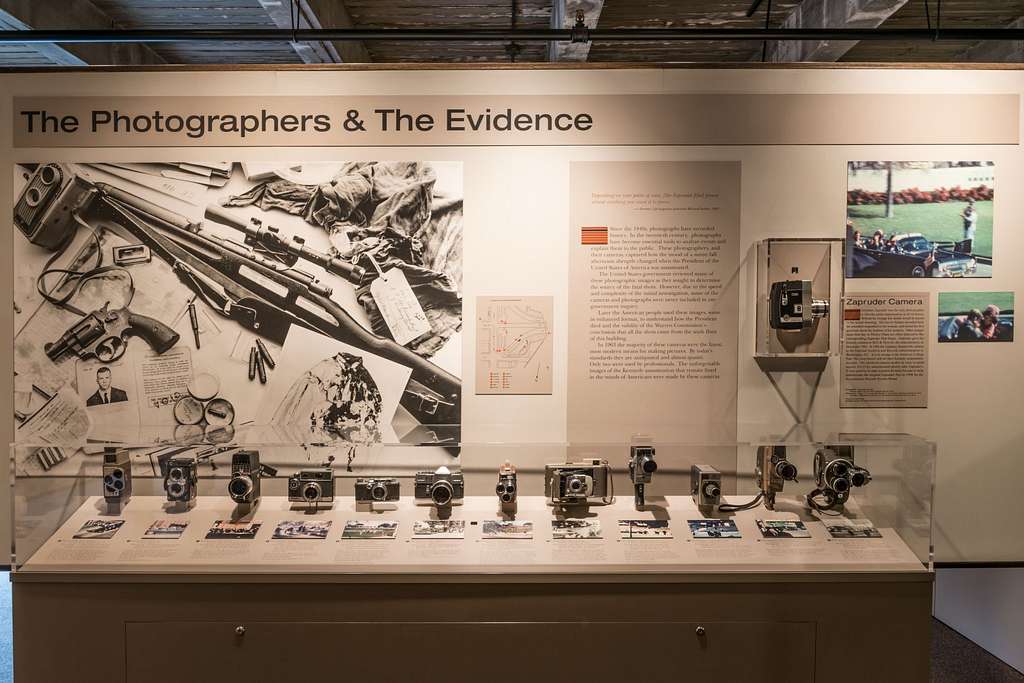
Exhibit showing cameras used by those who witnessed JFK's assassination
My teenage self was clearly still desperate for there to be a happy ending. I wanted the FBI, the CIA, the local police force, the secret service, the President’s personal security detail, and so on, all to have done their job properly and protected the President of the United States of America. Sure wasn’t America the most powerful country in the world, for heaven’s sake?
Yes, I wanted the President to not only survive the assassination attempt but to go on and win a second term as President. In my dream alternative reality, the Kennedy reign would not end there. JFK would then be succeeded by his brother Robert Francis Kennedy (known as Bobby), and in those additional three terms, the Kennedy brothers would help to create a much better world, where it was just possible for good to win out over evil, but where good would become the norm. My generation were pining for a world where it would be impossible to the likes of Mark Chapman and Michael Abram to roam free.
Naïve? Of course. But I believe my innocence stems from a 14-year-old boy who wanted more, who needed more, from the world he was about to set off into for a lifetime of adventures.
So, why did JFK mean so much to an Ulster teenager? Well, to me, he wasn’t an ‘old man’, nor a failed school comedian, as all politicians had appeared to me up to that point. He was young, he was charismatic, he was real, he was human, and he had a beautiful young wife, with a young family. It’s no wonder that people had begun to use the word Camelot to symbolise the romantic ideal we had all begin to feel part of. 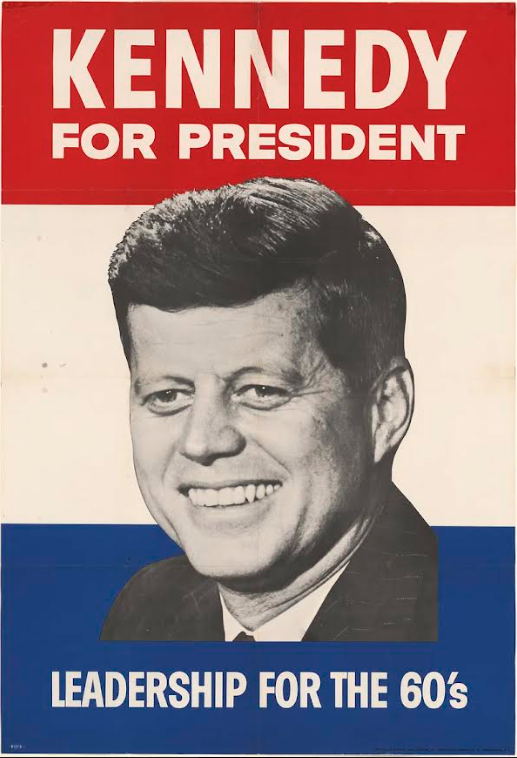
JFK brought youth and class and independence to the White House. He was very tight with his younger brother Bobby and I’ve always been a big fan of siblings who remain close. They seem to generate trust. Plus, we in Magherafelt figured that with a father as rich as Ambassador Joe Kennedy, JFK wasn’t going to be beholden to anyone.
Joe and Jack were both known to the Ulster community. They visited, and stayed in, Portrush in the summer of 1940. So we felt a connection, albeit a tenuous one. As a result, JFK wasn’t just a two dimensional photo in the newspapers, magazines or the moving images on the newly installed televisions. No, he was properly three-dimensional – and I’d never experienced such a connection with a public figure before. In addition to all of that, I was a big fan of all things American.
I regularly dreamt about going there, maybe even living there. It was after all, the home of the brave and the land of the free. I had this overwhelming feeling that, with JFK at the helm, the country was in good hands.
All of that came to an end, as Camelot came crashing down in smithereens on the 22nd of November 1963.
THE CIA, DULLES & J. EDGAR HOOVER
Let’s back track a couple of years and pick up the seeds of our, who, why and how, mystery.
This much we know: when Jack Kennedy and his brother Bobby, the United States Attorney General, took office, they discovered that a dangerous plan had been hatched by the CIA, under the direction of Allen Welsh Dulles.
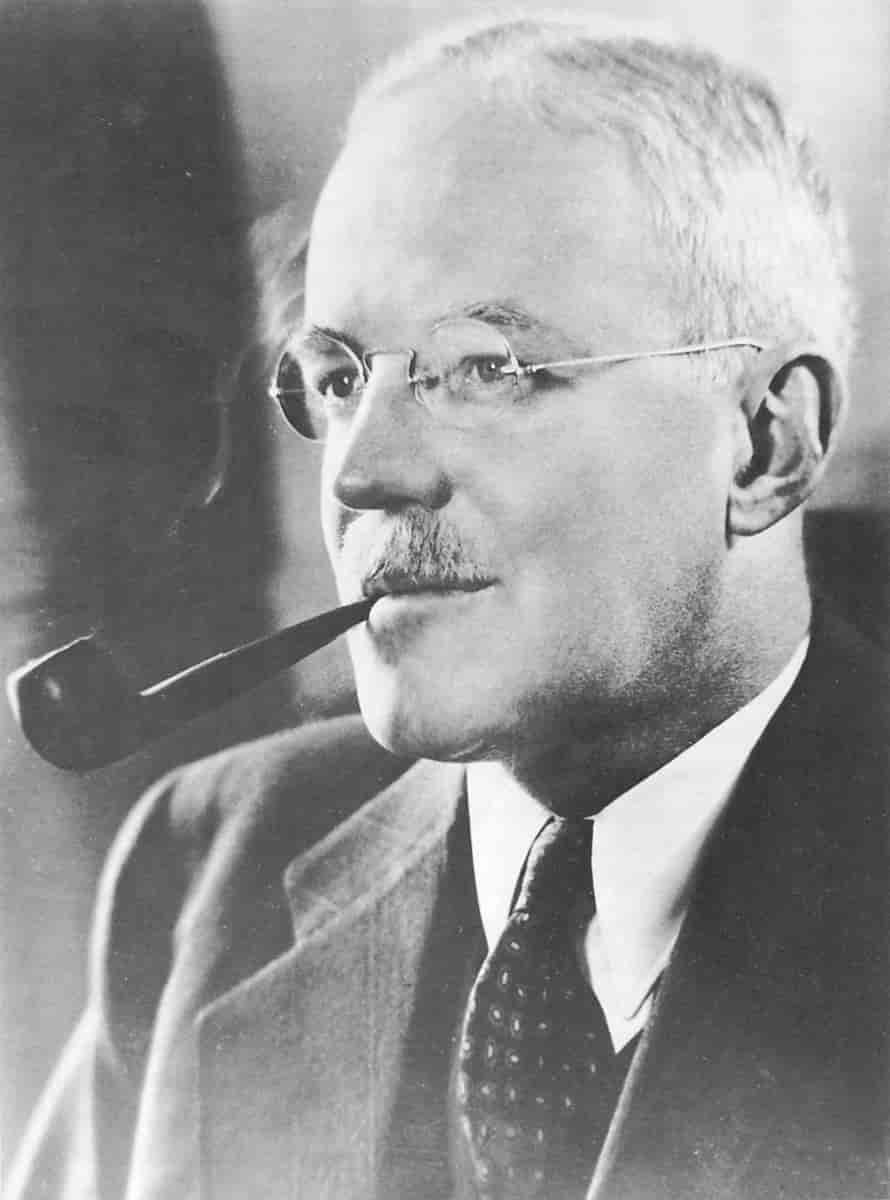
Allen Dulles
A group of disgruntled Cubans had moved to America following the Cuban Revolution (1959), when Castro overthrew the Cuban government and seized power as the new Cuban President. The plan – which Kennedy inherited from President Eisenhower and Dulles (the first Director of Central Intelligence of the CIA – the Central Intelligence Agency ) – was to join forces with the Cuban exiles – and to assassinate Fidel Castro and subsequently to invade Cuba.
Instinctively, the Kennedys didn’t feel comfortable with America imposing its will on other countries in this way, and immediately back-pedalled on the operation. They refused to allow a full invasion, or to offer air support. A much scaled-down, Bay of Pigs invasion went ahead with a strike force of just 1,200 (mostly Cuban expatriates with a few American nationals). It was a major disaster, which resulted in a hundred fatalities, with the remainder of the force ending up in Cuban prisons.
Strike one against team Dulles.
There was more. Allen Dulles and the CIA were behind the brutal murder of the Congo’s first democratically elected leader, Patrice Lumumba. Dulles knew how Kennedy would react and kept the information from the new President for over a month. JFK was visibly distraught when he eventually received the news from UN Ambassador Adlai Stevenson.
As with Castro, it was an issue of principle: why should American power-brokers feel they were entitled to overthrow the leaders of either the Congo or Cuba? It was another form of imperialism, and the American imperialists’ preference was to instal – or help to instal – regimes who'd allow their countries to be exploited for American gain. And so it ran in the Congo: the much loved and charismatic Patrice Lumumba was succeeded by the CIA-backed Mobuto, who went on to front a 32-year dictatorship sympathetic to US economic interests.
The White House, under the Kennedy regime, wanted poorer countries to protect their natural resources and to use the funds thus generated for the express benefit of their own people and economies. Yes, it was idealism taken to the Nth degree, but the Kennedys felt this should be the approach the new world order needed to take.
There was a selfish motive also, which involved reducing the amount of foreign aid the US government would need to pay out to these smaller countries. In theory at least, a by-product of the Kennedy idealistic approach was that there would be more money in the pot to make America a much better place for the Americans.
Strike two against team Dulles.
JFK didn’t wait for strike three before Dulles was out.
The President gave him the National Security Medal on 28 November 1961 and the very next day the White House released Allen Dulles’s signed letter of resignation.
Dulles had ruled the US espionage networks since his WWII days. He was regarded as a master of covert operations. He had helped develop and fine-tune the policies of the CIA and, by association, America. He was the longest serving head of the CIA – a record which still stands 45 years after his death. He had hand-picked all his CIA team and even had a major say in deciding his successor, John A. McCone. Yes, that is Cone and not Clone.
As the Kennedys would find out to their cost, the majority of the CIA staff were more loyal to Dulles than they were to the White House. Dulles, it seems, stepped down with a smile on his face. It was clear to all that he was still the CIA puppet master, ostensibly in the background, while he pulled the strings. The reality is that Allen Dulles was never going to go away quietly. Kennedy admitted to Charles de Gaulle that the White House did not control the CIA. Nonetheless JFK made it known he intended to reduce the CIA funding significantly. His ultimate ambition was to break the stranglehold on US foreign policy, exercised by the Central Intelligence Agency, entirely.
As if the CIA wasn’t enough, the Kennedys had another mortal enemy in J. Edgar Hoover. With his detailed, often embarrassing, files on absolutely everyone, Hoover was another infuriating presence at the heart of the American political machine. Like the Dulles brothers, he operated at a high pitch of paranoia and anti-communist zeal.
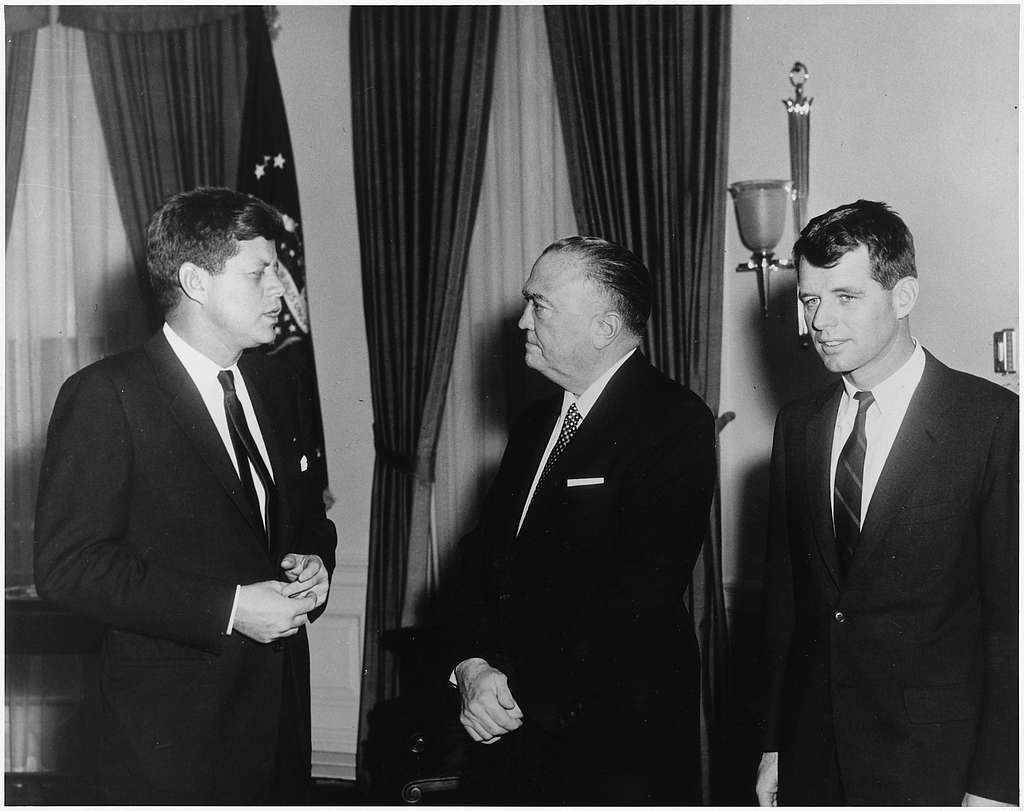
Pictured (L-R): President Kennedy, J. Edgar Hoover, Robert F. Kennedy
Is it too simplistic to say that JFK and RFK shared a priority for a peaceful world, and honouring absolutely everyone as equals? I don’t think so. Sure, the hard facts of politics can make acting idealistically extremely difficult, if not impossible on occasion – but they’d already point blank refused to invade Cuba against the overt and covert advice of JFK’s commanders-in-chief, housed in the Pentagon. War meant vast sums of money going to the War Agency. The Kennedys made no bones about the fact that they also, against the advice of the very same commanders-in-chief, wanted to pull the US army out of Vietnam as a matter of priority.
They wanted peace.
Peace would have meant a lot more money in the pot to help make America a better place for the Americans.
Peace would also have meant the warmongers were out of pocket.
And that, it turned out, would be a big problem…
JOE KENNEDY, CARLOS MORCELLO AND LBJ
In the Kennedys’ endeavours to make America a better country for Americans, Bobby Kennedy made its top priority to go after organised crime. One of his main targets was the New Orleans based, Sicilian Mafia boss, Carlos Marcello. As early as 4 April 1961, less than three months after JFK took office, Marcello was publicly humiliated when RFK had him arrested and immediately deported to Guatemala.
Not for long. Marcello managed to find his way back into America a few months later. In November 1963, the month that President Kennedy was assassinated, Marcello was back in court again, this time for defrauding the American government by securing a false Guatemalan birth certificate. He was acquitted in dubious circumstances, but the following year he was arrested and charged with jury tampering and attempted murder of a state witness. Once again he walked free, when prosecution witnesses refused to testify.
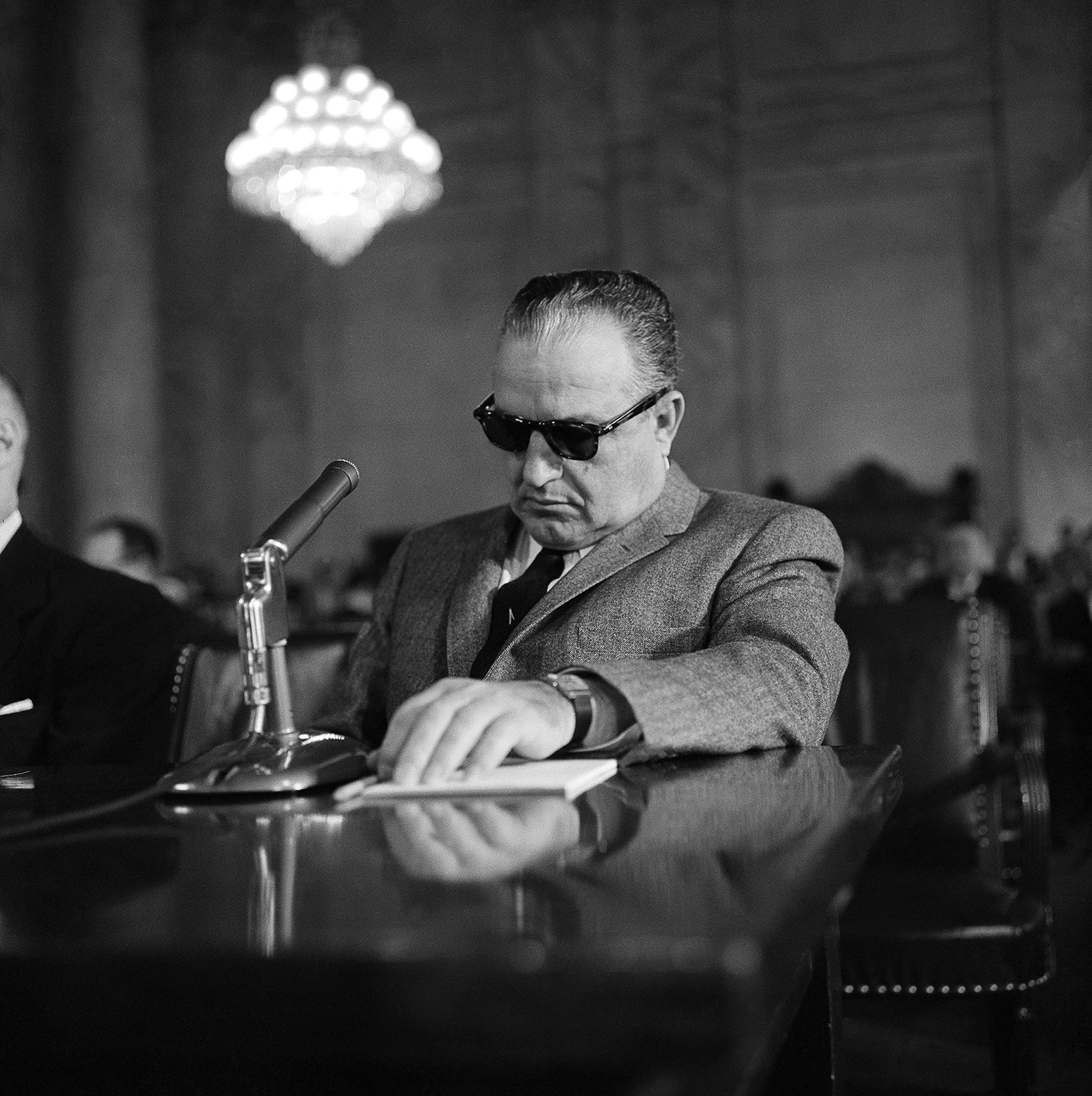
Carlos Marcello, shown as he appeared before the Senate Rackets Committee, March 23, 1959, Washington, D.C. (AP Photo/Henry Griffin)
Then again, the mobsters may have had a half-reasonable gripe against the Kennedy brothers. As we now know far better than we did then, American presidential elections are fearsome battle-grounds. There are key swing states: lose enough of them and your campaign is toast. In the final analysis, in his battle with the Republican Party candidate Richard Nixon, Kennedy edged the popular vote by a tiny margin, winning 49.7% against 49.5%. But, in the crazy US electoral college system, he romped home 303 votes against Nixon’s 219.
The allegation has been made that, with the race neck and neck, Joe Kennedy – father to JFK and RFK – had turned to the Mafia to help deliver two key states, where the mobsters controlled the union votes. That was vital, the argument runs, in helping swing the election from Richard Nixon to JFK.
No doubt mafia support came at a serious financial cost to Joe Kennedy. More importantly however, this analysis says, the mobsters still felt they were owed a favour – and so they were outraged when RFK began to hound them, in an effort to hold them to account for their activities in the organised crime world.
And then there was the strange and deeply contradictory figure of Lyndon B. Johnson.
I’m a big fan of Robert A. Caro’s writing. After I finished reading his four-volume LBJ biography, I came away thinking, “Okay, so now I’ve ticked off the who and the why boxes in the JFK mystery, all I need to do now is to figure out the how.”
I should state loudly, and for the record, at this point, that in The Passage of Power: The Years Of Lyndon Johnson, volume four of Mr Caro’s meisterwerk, he wrote that he had discovered no proof linking LBJ to JFK’s assassination. Maybe he’s saving that for volume five, which is due any year now. I say, ‘any year’ rather than ‘any day,’ under advisement. But we’ll get back to LBJ later.
Where were we? Oh yes… we went looking for peace. Sadly the desire for peace came at a cost. JFK was cut down in cold blood, with his wife beside him, as he drove in a cavalcade through Dallas, Texas. But exactly by whom? And how many of them were there?
They say the meek will inherit the earth. What they don’t tell you is: that will only happen after the earth has been milked of all its treasures and wealth.
TOMORROW: PART 2 – LEE HARVEY OSWALD, LYNDON JOHNSON & THE MYSTERIOUS JOURNALIST WHO CLAIMED TO HAVE SOLVED THE MURDER
Paul Charles was born and reared in Magherafelt, in Co. Derry and began his career in “music” managing a band called Blues By Five. He went on to become one of the leading music agents on the planet. Over the past 40 years, he has worked with some of the biggest names in music, at different times managing the careers of Van Morrison, Ray Davies of The Kinks, Gerry Rafferty, The Waterboys and Dexys Midnight Runners, and launching Tanita Tikaram into the world.
Earlier this year, he released his acclaimed memoir, Adventures In Wonderland – with the book hitting the No.2 spot on the Amazon music business chart.
RELATED

- Opinion
- 24 Nov 23
JFK Anniversary, Part 3: Murder, Scandal & Cover-Ups

- Opinion
- 22 Nov 23
JFK 60th Anniversary, Part 2: Sex, Lies & Zapruder Tape
RELATED

- Opinion
- 19 May 23
Album Review: Graham Nash, Now

- Opinion
- 24 Dec 25






